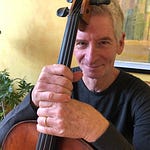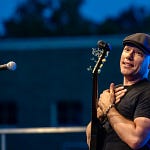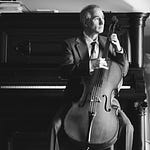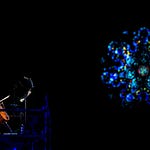009 Tony Hume

Photo by Laurel Edwards
Transcript:
Tony Hume: And then he does these crazy stage antics where he kind of looks like he's bowing on stage, and dropping to his feet... except he dropped and collapsed on top of a monitor and died on stage.
[intro]
Trevor Exter: Welcome to another fine episode of Play It Like It's Music. Musicians in their own words. Today we have Tony Hume, who's not just everybody's best friend backstage, but also a veteran bandleader and performer himself. We were in too much of a time-crunch for me to record him playing, but the night after we spoke I witnessed him holding court at a campfire jam with about 200 people getting quite sweaty and singing at the top of their lungs. This guy brings it.
Tony's day job in music is artist relations, and he works with a lot of heavy hitters. Today we're going to get some great scoops on the day-to-day life of a touring musician at the highest level, and what that all entails. Tony has done it all and seen even more, it was a real pleasure to hang out with him as always.
Tony Hume: I am Tony Hume. On this particular event - where we are talking on the top of Stratton Mountain in wonderful green Vermont - I happen to be a special events coordinator and my role, particularly on this event, is the extracurricular activities. Like a silent disco and a barbecue on Thursday, and “Uncorked”, which is a wine tasting, and different things like that. Extracurricular special events.
Trevor Exter: Why do you play music?
Tony Hume: I have to play music, I learned song lyrics before mathematics times tables. I was an only child, latchkey child at that, my mom was an Elementary School teacher, so here I am waiting on the school bus, to arrive at elementary school, rocking my mom's Magical Mystery Tour LP’s, Barbara 8 tracks, I have a passion for music all my life. It's just something that's been a part of me, it's an amazing thing in life when you can turn a passion into a career, and I feel I have done that. My work is surrounded by music it involves music in some fashion or another, whether I'm driving U2 to the airport, or the Beach Boys to the airport, or I'm hanging out with Eddie Vedder backstage making sure their dressing room's cool. It's surrounded by music, I'm a part of that vibe and positivity that keeps that whole thing going
Trevor Exter: you work with everybody, just briefly describe some of the other hats you've worn throughout your career.
Tony Hume: oh, okay, so let's back it up to me being an artist.
[music]
I formed my first band 1995 in Orlando Florida, basically kept the bass player and the keyboard player with me for a decade. You know my “sex, drugs and rock n roll” years in Orlando, Florida. That band ended, I continued to play music, I joined another band, I played solo, blah, blah, blah, and then I had an opportunity to step into the role of tour manager. The recently late great Colonel Bruce Hampton was my very first guy I tended to, 2007 to 2009. Two years with Colonel Bruce, educated me in all the ways of what not to do on the road. He's toured for, you know, decades upon decades, and he's done everything good and bad that people won't have to then replicate the bad. You can take all the good things and all that knowledge, and then move forward.
Trevor Exter: he mentored you or you just fucked up a lot and he schooled you?
Tony Hume: I hope I didn't fuck up a lot, and got schooled. He definitely was a mentor, more importantly a friend which made it really, really, hard on that day. We can give a quick back story on Colonel Bruce. There was a show this past May 1st, 2017 at the beautiful Fox Theater in downtown, Atlanta, and this concert was called Hampton 70, it was a concert for the day after his 70th birthday, brought together members of Widespread Panic, Phish, all these great stars, Derek Trucks, Susan Tedeschi, these amazing stars who have all loved and have been influenced by Colonel Bruce. At the apex of this concert was 20, 22, maybe 25 different musicians on stage, the very last song of this particular performance was… goosebumps... Turn On Your Lovelight, which is a Grateful Dead cover now known by deadheads as a Grateful Dead song, but it was actually a Bobby Blue Bland's song, Turn On Your Lovelight, very first song Bruce ever sang live, ever, in the 60s. Last song of this concert, he ended up pointing off to the youngest member on stage, guy named Taz a 16 year old guitar player, Prodigy, passed it off, made him play a solo, and then he does these crazy stage antics where he kind of looks like he's bowing on stage, and dropping to his feet, except he dropped and collapsed on top of a monitor and died on stage. Total hair-raising right now on the back of my head, he died on stage.
Trevor Exter: and you were there?
Tony Hume: I was there, was there. May 1st, never... day I'll never forget. He died on stage, surrounded by people on stage that loved him and adored him, a crowd of people in attendance that loved and adored him. I mean Rock n Roll exit unlike, you know, anything. Comically would be related to like Spinal Tap, but this was like serious, and he died.
Trevor Exter: People don't really get that much of a sense of what the road life is actually like. A lot of people... they're doing music, but they're not on the road, and they’re two very, very different environments. It really sort of shakes out the dilettantes pretty quickly, though the people who are veterans and the people who are practitioners, and who are still doing it and still committed. You've worked with a huge number of those people... if you could list some of them for me, just for the listeners benefit...
Tony Hume: Tour managing wise which is wearing the hat of Mom, Dad, tour accountant, psychologist, friend, boss, leading a band across the country, making sure everything is set up before the arrival, making sure that the amenities that you need for a good show are set when you arrive, collecting cash at the end of the night, saying goodbye and thank you, leaving - you know - hopefully a positive feeling about you and your band and then moving on to the next town. My role as tour manager, I was fortunate enough to work with Colonel Bruce Hampton for two straight years, moved on to Soulive and Lettuce, did a little bit of Soulive and Lettuce, did two years with Karl Denson's Tiny Universe, did one year with Leftover Salmon, did a tour with friends of mine moe. out of Buffalo, New York, another tour Nahko and Medicine for the People, but I'm just now starting in 2017 my fourteenth year of working large-scale music festivals all across North America. And that list of bands, working as an artist relations liaison, is certainly hundreds. Two weeks ago for instance, I was the position of headliner runner, which is errand boy, driving bands or crew back and forth to their hotels, picking up certain things they need, but I worked with U2, the Red Hot Chili Peppers, Chance the Rapper and Lorde. That was my Bonnaroo. You know two weeks ago, but yeah before that, a lot of jam bands I mean from anybody from Gregg Allman to Bruce Hornsby, to Umphreys McGee.. but yeah just hundreds upon hundreds.
Trevor Exter: What's the rudest thing a musician ever did or said?
Tony Hume: I've been pretty fortunate, I have a work persona that I'm able to jump into and just kind of naturally let fly where I feel like I can make the people around me at ease. I can lift the energy in the room up, I can keep the vibe positive. There's grumpy people, you're on like, three weeks of a three-week tour you're probably not sleeping all that much. Travel days in between concerts are usually harder than just playing a concert. I've witnessed “diva” moments: Shania Twain throwing a flower vase across the room, because the flowers are the wrong color. I've witnessed Mariah Carey not satisfied with the color leather couch that was put into her dressing room. I've seen Diana Ross be upset because even though there were 170-some flowers in her dressing room they were not the right kind she wanted. So diva moments for sure, but rude? Kind of take it with a grain of salt, you never know what somebody's going through in that particular day. I have tons of positive memories about people that were cool to me and cool comments said to me from say Slash telling me, “man your vibe is so cool, I did great hanging out with you” that'll stick in my mind way more than a rude moment of somebody's random day. Shall we tell the listener the quick tale? Very, very, very short tale: this is Gregg Allman from The Allman Brothers. Recently passed away here in late May 2017. My recollection of working with the Allman Brothers one night as the artist relations manager for this festival called The All Good Music Festival. My job was to go pick up Greg from his dressing room in a golf cart and drive him all of, you know, 600 feet to the stage, super short, but he had just undergone a transplant. His health was kind of not the greatest in the world. You know he could have eaten something funny or not eaten enough that day, had some low energy. The golf cart, you know, sometimes on a golf cart if you step on the gas pedal, some are jumpy and take off, some are slow, slow to take off. This one happened to have a little jump, right? So Greg, Greg from the backseat goes, “oh you're goddamn NASCAR driver to aren't ya?” I turn around thinking he's kind of half joking, I was like, “oh that was a little fast for you?” And he's like, “oh, and you're a smartass too?” and at that point essentially we'd gotten to the stage, so I mean, I'm just in utter disbelief, jaw on the floor basically that Gregg Allman just said you're a NASCAR driver and a smartass, and got off the golf cart all pissed off, walks on stage and plays his set. So for most of the set I'm just kind of like baffled that I just pissed off Greg Allman. He's our headliner and I just pissed him off and mentally you're going through it, I'm just like, I just can't believe it you know, I'm such a nice positive guy here and I just pissed this guy off, so after the show he actually made a point to come to me and said, “hey, I'm really sorry about earlier, I just you know, having a rough day..” something like that, but it was just... Gregg Allman, internationally-known, doesn't need to take a moment to make an apologetic comment about one single comment that he made to some guy he'll never, you know, basically never ever see again.
Trevor Exter: This whole thing of musicians losing their temper and stuff, for me it's just an indicator of what an artist is going to use to keep themselves sane in unfamiliar situations.
Tony Hume: Great, actually something really comes to mind actually: late great Chris Cornell from Soundgarden. Who recently passed away by his own hand. He... Audioslave was playing a show in Orlando, Florida at the Hard Rock Live, which is a 3000 person music Venue that the Hard Rock owns on Universal Studios property. I used to be a hard rock guy. I was an international trainer for the Hard Rock. Chris Cornell was playing the show, Audioslave. I'm walking down the hallway, and there's like this banquet storage room under the stage tables, and you know all kinds of crap that they might need to set a banquet up at some point, and I hear this like WOOF…. clank, clank, clank. I open the door, and it's Chris Cornell with a set of throwing knives, and he's taken one of these eight foot banquet tables and set it up on its end, and he's tossing them from across the room. A little pre-show sanity-keeping pre-show warm-up, pre-show something, except none of the knives are sticking in the table and the clang clang clang is the knife sliding across the floor, so I mean just thinking randomly like, you know, here's a guy he's toured the world, done it for decades, and like you know he just has some knives. Maybe that's just his way to calm down or prepare, just waste some time before the show.
Trevor Exter: I want to ask you about your early days, like what brought you to music?
Tony Hume: Grateful Dead, starting with The Grateful Dead. I first saw my first Grateful Dead show summer 1990. Just graduated high school, summer of 1990. I was 18, went with a couple of friends. It was a brand new experience. I never, never knew anything about it much, you know heard a couple of songs on the radio that was about it, and was completely blown away. Not only do you have this band that travels around the country and plays different songs every single night that never gets repeated, but you have this community of people that have a very similar musical passion that they're all there for the music and the way the music connects with them, the way the music feels and makes them feel.
Trevor Exter: Were you playing before that?
Tony Hume: No, no not at all, not at all. I did not even learn to play guitar until after that first Grateful Dead show, so it was probably the spring of 1991, my dad had given me a guitar that was his. Always had it, just kind of, you know, hit the strings, you know what are these strings for? Just hit the strings didn't really know how to play at all. A friend of mine that was a Grateful Dead fan as well, deadhead, showed me a couple of chords. I wanted to learn how to play this one song, “Eyes Of The World”. It has an E Major 7th which is a slightly different, you know, chord, than just a regular basic E chord. That was like the pivotal thing, I wanted to learn how to play that song because that song brought me so much joy. If I could play it, maybe I could replicate the joy. And then I saw how I felt at a concert and the feeling that I got from the music and I wanted to give that, I wanted to give that to people, I wanted to be someone on stage that connected musically and shared that same exchange of energy in a live setting. That's what pushed me in. And then of course the band Phish was very pivotal and huge for me, Phish... same thing. Different songs every single night, travel all over the country, very fervent fan base, just like the Grateful Dead has, Phish heads instead of dead heads, so that really pushed me into playing live music. I wanted that energy exchange with people, I wanted to create smiles and create closed eyes, head spinning, dancing, noodling all over the place, like I wanted to be a part of that exchange of energy
Trevor Exter: so you were a fan, and then you learned to play then you went to work for the exact heroes that inspired you to do music in the first place?
Tony Hume: Pretty much, I started to... Before I became a tour manager, kind of in the tail end of when my band was sort of uh at the beginning stage of like disillusioned, dissolving, and a friend of mine was running a festival in South Florida called Langerado. Spring break kind of a festival. I said “man. I really like what you're doing here, this festival.” We played the first festival as an artist. The next year I came back I was like, we're not playing this year. I wanted, I want to do something. Like I love it. I just love what you're doing can I be a part of it? And he's like “yeah, you know I've got this role, it's gonna be really cool for you. Maybe go handle this, we have a…” This band, Soul Live randomly enough, Soul Live was playing an after party, but it's an official festival party. “I want you to go, basically be the liaison between us, the music venue and the band. Just represent us and go hang out with this band.” That's right, so that turned out to be what we call “artist relations”. And artist relations - as you deal with, being a talent yourself - artist relations is that person whose essential, their whole job is to make sure you're cool. That's literally right... When it comes down to the easy definition, artist relations is to make sure the band's cool. That was how I got into the music festival world, is being, as an artist I knew what artist kinda would like and appreciate, and somebody that looked out for them, and that was it. Now we're fourteen years later, and I'm still doing it.
[00:15:00]
Trevor Exter: I could imagine myself going absolutely nuts if I did what you do, but you seem to take to it quite well. What's your secret?
Tony Hume: Some people in this world have to work. Some people do manual labor, they build houses or roofs, or whatever, and whatever you're like... Bob Dylan has a great quote, if you're called upon to be a roofer you should be the best roofer you've ever been, if you're called to be a shipbuilder you should be the best shipbuilder anybody's ever seen. So I feel like my calling is surrounded in music, and if I can make people comfortable and relaxed and keep the vibe positive and happy and that will in some way help them to relax and then go onstage and be the the portal that lets music flow from inside and come out, you know through an electromagnetic speaker, and then touch the audience in some way, and I can play some sort of little part of that. That's it for me right? Live the life you love, love the life you live.
Trevor Exter: Awesome. I think I got what I need man. Thank you.
Tony Hume: Is that it? Thank you Trevor, and when are you, when do you play next?
Trevor Exter: I'm doing Carmen’s thing. [conversation trails off].
OUTRO:
Alright, how about Tony Hume? You can find him on the road at all the major music festivals. That's our show thank you for listening, and thank you Tony for sharing these stories with us. This podcast is an independent production hosted by me, Trevor Exter. Go to playitlikeitsmusic.com to find out more. Hanging out with real musicians at work is the best, and you just got a taste of it, see you next time. This is Play It Like It's music.













Share this post